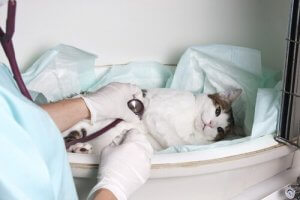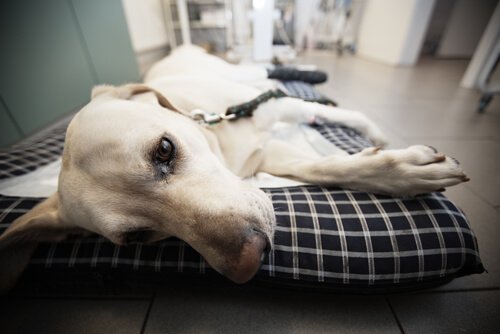The Most Common Emergencies in a Veterinary Clinic

Even if we give our pets lots of attention, they can still get sick or find themselves in situations that require immediate medical attention. Today, we’ll tell you about the most common emergencies in a veterinary clinic when it comes to dogs and cats. It’s often the case that if you don’t act quickly, your pet’s life could be in danger.
1. Accidents are common emergencies in a veterinary clinic

Dogs can escape from the house or get off their leashes. If you live in a big city, there’s a high risk of your dog getting hit by a car if he gets away from you.
Cats can also get run over. And, despite their reputation of having nine lives and being able to land on their feet regardless of where they fall from, they often hurt themselves. This is especially true if they lose their balance while exploring high-up places.
Cats and dogs are also both prone to injuries with sharp objects, getting burnt, or getting hit with different types of objects. These dangers can be both inside and outside of the home. All of the situations can definitely be avoided. However, when they’re not, they’re among the most common emergencies in veterinary clinics.
Our beloved pets aren’t exempt from accidents or diseases that require immediate medical attention. If you don’t take them to the vet right away, you could be putting their lives in serious danger. We’ll tell you about the most common emergencies in a veterinary clinic; some are preventable while others are completely unexpected.
2. Choking in dogs and cats
Pets are curious by nature and usually put objects in their mouths to nibble on or to play with. Some of these objects are:
- Toys
- Socks and other clothing
- Rope
- Sticks
- Stones
- Elastic rubber bands
- Buttons
- Bottle caps
The problem is that sometimes our pets swallow these objects. And, depending on the object that they swallowed, they may suffer serious injuries as a result. Regardless of what they ingested, you should take them to the vet immediately.
If your pet was lucky enough not to choke on the item, they still run the risk of the object obstructing their digestive system. Another risk is stomach perforation. Surgery is required in both of these cases.
3. Poisoning and intoxication
If our dog or cat gets out onto the street without us knowing, there’s always the risk of them getting poisoned. They may find different substances in the street or unkind people may purposely try to harm them.
However, you should also keep in mind that items in your own home, or in the garden, can also be hazards for your pet. The following things can poison our pets:
- Bait
- Plants
- Human medications
- Foods not suitable for dogs or cats
- Cleaning products
4. Feline urinary tract disease
Urethral obstruction is a serious problem that mainly affects male cats, but dogs can also suffer from it. This condition carries the risk of death, because if there is total obstruction then the urine won’t be able to exit the bladder. Therefore, the animal must go to the vet immediately so that the obstruction can be taken care of. The following may be the cause of these obstructions:
- Mucus
- Urinary sediment
- Small bladder stones
A cat that can’t urinate will become restless. He’ll repeatedly lick his penis and he’ll try to urinate everywhere, not just in his litter box. Pay close attention to these signs, because an animal with this condition must go to the vet as soon as possible.
5. Gastric torsion in dogs

Gastric torsion is a condition that usually occurs in larger breeds of dogs; however, it can also occur in cats. This is when the stomach’s ligaments can’t handle the dilation caused by an accumulation of gas, food, and liquids.
Then, the animal’s stomach starts to twist, and this compresses the arteries, veins and blood vessels in the digestive system. This causes an interruption in his blood circulation and some of his organs will stop working as a result. Needless to say, it’s a veterinary emergency and the animal’s life is at serious risk if you don’t take care of it in time.
Even if we give our pets lots of attention, they can still get sick or find themselves in situations that require immediate medical attention. Today, we’ll tell you about the most common emergencies in a veterinary clinic when it comes to dogs and cats. It’s often the case that if you don’t act quickly, your pet’s life could be in danger.
1. Accidents are common emergencies in a veterinary clinic

Dogs can escape from the house or get off their leashes. If you live in a big city, there’s a high risk of your dog getting hit by a car if he gets away from you.
Cats can also get run over. And, despite their reputation of having nine lives and being able to land on their feet regardless of where they fall from, they often hurt themselves. This is especially true if they lose their balance while exploring high-up places.
Cats and dogs are also both prone to injuries with sharp objects, getting burnt, or getting hit with different types of objects. These dangers can be both inside and outside of the home. All of the situations can definitely be avoided. However, when they’re not, they’re among the most common emergencies in veterinary clinics.
Our beloved pets aren’t exempt from accidents or diseases that require immediate medical attention. If you don’t take them to the vet right away, you could be putting their lives in serious danger. We’ll tell you about the most common emergencies in a veterinary clinic; some are preventable while others are completely unexpected.
2. Choking in dogs and cats
Pets are curious by nature and usually put objects in their mouths to nibble on or to play with. Some of these objects are:
- Toys
- Socks and other clothing
- Rope
- Sticks
- Stones
- Elastic rubber bands
- Buttons
- Bottle caps
The problem is that sometimes our pets swallow these objects. And, depending on the object that they swallowed, they may suffer serious injuries as a result. Regardless of what they ingested, you should take them to the vet immediately.
If your pet was lucky enough not to choke on the item, they still run the risk of the object obstructing their digestive system. Another risk is stomach perforation. Surgery is required in both of these cases.
3. Poisoning and intoxication
If our dog or cat gets out onto the street without us knowing, there’s always the risk of them getting poisoned. They may find different substances in the street or unkind people may purposely try to harm them.
However, you should also keep in mind that items in your own home, or in the garden, can also be hazards for your pet. The following things can poison our pets:
- Bait
- Plants
- Human medications
- Foods not suitable for dogs or cats
- Cleaning products
4. Feline urinary tract disease
Urethral obstruction is a serious problem that mainly affects male cats, but dogs can also suffer from it. This condition carries the risk of death, because if there is total obstruction then the urine won’t be able to exit the bladder. Therefore, the animal must go to the vet immediately so that the obstruction can be taken care of. The following may be the cause of these obstructions:
- Mucus
- Urinary sediment
- Small bladder stones
A cat that can’t urinate will become restless. He’ll repeatedly lick his penis and he’ll try to urinate everywhere, not just in his litter box. Pay close attention to these signs, because an animal with this condition must go to the vet as soon as possible.
5. Gastric torsion in dogs

Gastric torsion is a condition that usually occurs in larger breeds of dogs; however, it can also occur in cats. This is when the stomach’s ligaments can’t handle the dilation caused by an accumulation of gas, food, and liquids.
Then, the animal’s stomach starts to twist, and this compresses the arteries, veins and blood vessels in the digestive system. This causes an interruption in his blood circulation and some of his organs will stop working as a result. Needless to say, it’s a veterinary emergency and the animal’s life is at serious risk if you don’t take care of it in time.
This text is provided for informational purposes only and does not replace consultation with a professional. If in doubt, consult your specialist.








